How Do I Know if the Abortion Pills Worked?
This article was developed in partnership with Reprocare for informational purposes. It is not medical or legal advice. We believe everyone has the right to accurate and stigma-free information so they can make the best decision for themselves 💜
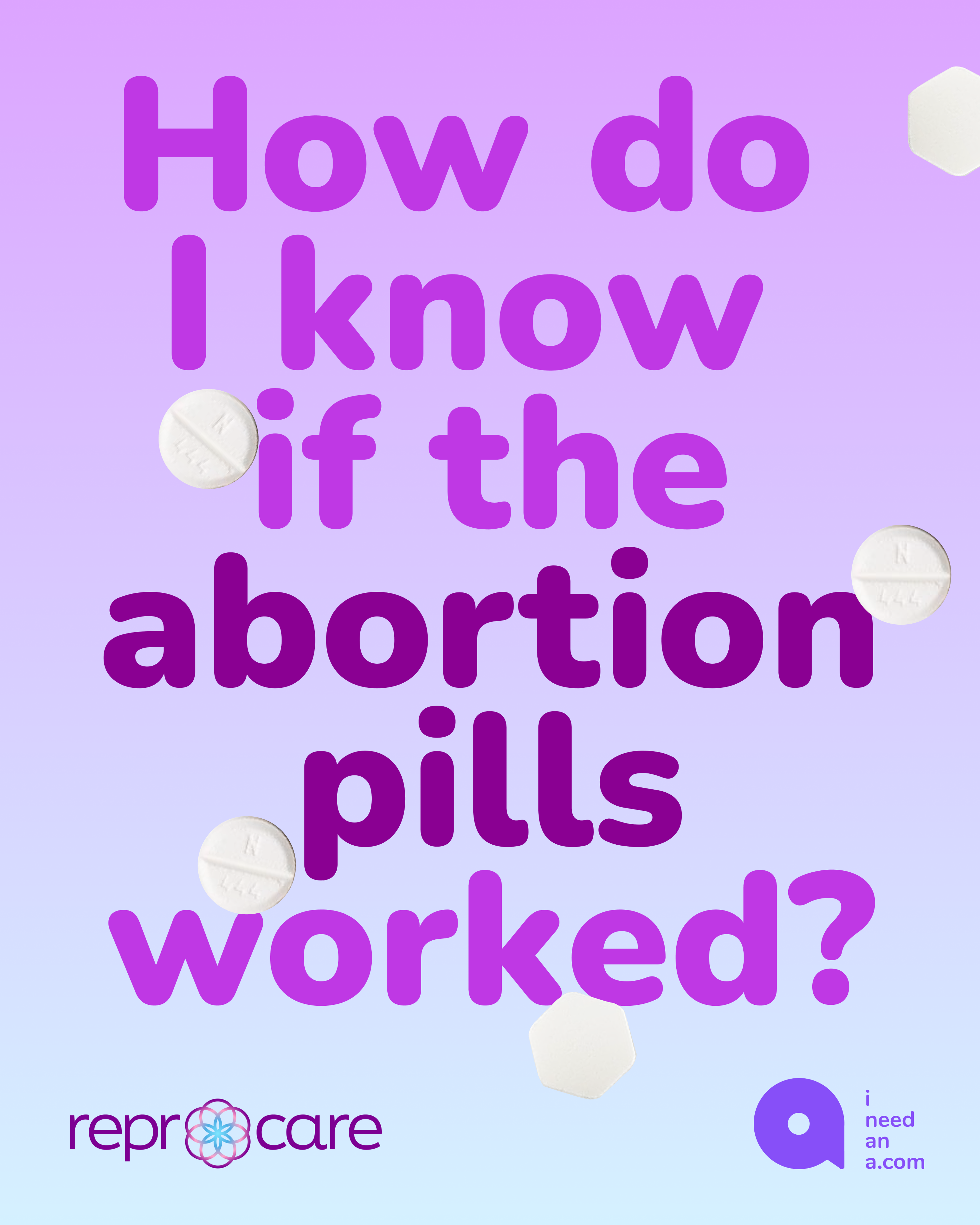
Abortion medications are extremely effective in ending a pregnancy when following the correct protocol, and many people do this successfully every day. If you had bleeding and passed any clots, it’s very likely the abortion was successful. But, let’s dive in deeper into what to expect and the timeline so you feel confident and prepared!

Pregnancy symptoms like nausea, breast tenderness, tiredness or fatigue should go away.
Pregnancy symptoms disappearing are a good way to tell that the pills worked. Nausea and fatigue should go away within a few days, and breast tenderness can take longer, maybe up 1-2 weeks. Not “feeling pregnant” anymore is a sign that the abortion was successful.
You see the pregnancy in your pad or in the toilet.
Less than 8 weeks since the last menstrual period:
Some people report seeing white tissue of the pregnancy sac, but most people don’t see anything because it is so tiny. Passing any clots is a good sign!
Between 8 and 10 weeks:
People may be able to spot the pregnancy or sac (though it’s still less than an inch long) if they choose to look.
After 10 weeks:
The pregnancy or sac will look different from other clots.
It’s also ok to not look for a pregnancy/sac or inspect the pad or toilet. The experience can look and feel different.
Go to this article for information about pills after 12 weeks.
Have more questions about how many weeks you are and what you might see? Reach out to Reprocare (833) 226-7821 or M+A Hotline (833) 246-2632 and talk to a counselor or clinician!
You can take a urine pregnancy test 4 weeks after the abortion.
Pregnancy tests have gotten really great at detecting HCG (the pregnancy hormone) earlier, which can be frustrating when you are no longer pregnant but the test is still detecting the small amount of hormones still in your body. It’s possible to test positive on a pregnancy test up to 6 weeks after a successful abortion.
We encourage everyone to take a home pregnancy test 4-6 weeks after taking the abortion pills.
Trust your body.
We know it can be hard, but you really can trust your body! We’ve been made to feel like we can’t trust our bodies and can only rely on a medical professional to confirm.
It’s also normal to want confirmation! Want to ask a doctor or nurse?
Call the M+A Hotline at (833) 246-2632

What are other ways to make sure the pills worked?
You could get an ultrasound. Waiting 1-2 weeks can give the uterus time to empty and avoid an unnecessary procedure.
You could also get two quantitative beta hCG tests (blood tests) at least 48 hours apart, and if the hCG levels go down between the two tests that means you are no longer pregnant.
And Ineedana.com has built a database of trusted providers in heavily restricted states where you can get ultrasounds, pregnancy tests, post abortion care and miscarriage management.
Find ultrasound providers near you
If you need an ultrasound and are in a state with abortion restrictions, here are some trusted providers that can help you.

Other common questions
I’m worried about an “incomplete” abortion.
The support team at Reprocare hear this concern a lot– it is normal to continue passing blood and tissue in the days and weeks after a successful abortion. An incomplete abortion is when too much blood and tissue remains in the uterus days to weeks after taking the misoprostol, and it has noticeable symptoms.
These symptoms include heavy bleeding for hours that doesn’t slow down, fever above 100.4, and/or severe pelvic pain that can’t be relieved by painkillers like ibuprofen more than 2 days after the abortion process. This is rare, but someone experiencing these symptoms should seek medical care.
If you want more guidance, reach out to one or both of these hotlines:
Call, text, or Signal message Reprocare at (833) 226-7821
Call or text the Miscarriage + Abortion Hotline at (833) 246-2632 to talk to a clinician.
I’m actually pretty sure the pills didn’t work, what do I do?
There is a small possibility the abortion pills didn’t work at all. If someone did not bleed or pass clots, or had only light spotting, another dose of misoprostol can be taken.
If the abortion was unsuccessful, you can try again by repeating the abortion medication protocol or get an in-clinic procedure.
What if I’m over 12 weeks pregnant?
For people who are over 12 weeks and using abortion pills, we have an article about what to expect. Someone at this stage will know the process was successful because they passed a fetus and the placenta.
What are normal symptoms during an abortion?
- Heavy bleeding
- Passing small or large clots or some gray or white tissue
- Cramps or abdominal pain
- Back pressure or pain
- Nausea and/or vomiting
- Diarrhea
How long will I bleed for?
Usually after taking the misoprostol, people have the heaviest bleeding and passing of clots and pass the pregnancy within 12-24 hours.
It’s normal to continue bleeding or passing clots in the days and weeks after, sometimes bleeding continues up to the next menstrual period (4-6 weeks later).
As long as the following complications aren’t happening, you’re ok.
Potential complications more than 24 hours after taking the pills:
- Having very heavy bleeding and soaking through more than 2 overnight maxi pads per hour for 2 hours in a row
- Severe pain that isn't better with over the counter pain medications (like tylenol or ibuprofen).
- Running a fever of 101°F or greater and/or a really foul smelling discharge. These (in addition to pain) are signs of infection and should be treated immediately.
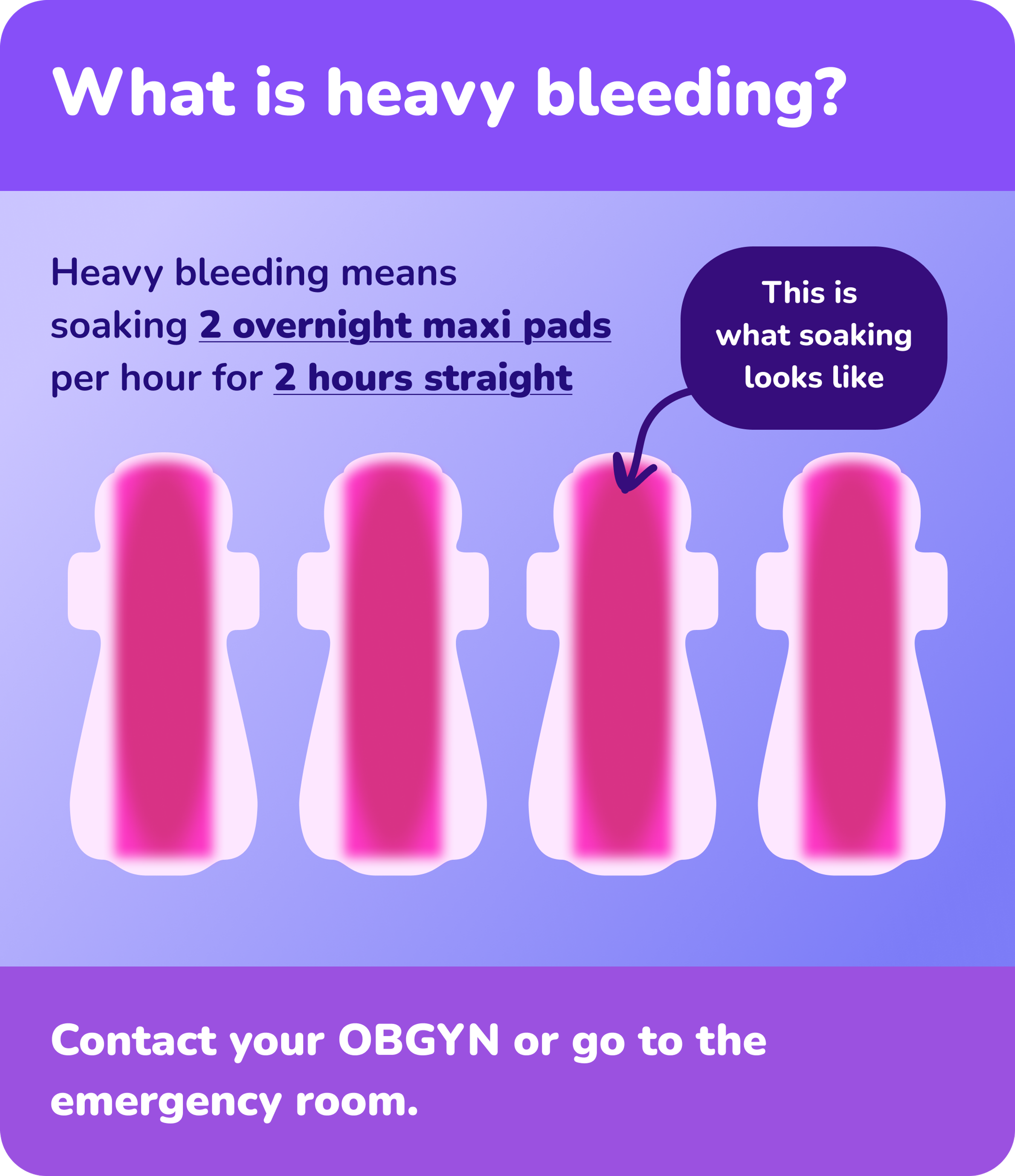
Learn what to expect if you go to the ER after an abortion or miscarriage.
It’s normal to feel stressed about this but these resources are here to support you! You aren’t alone <3
Loved this article?
Share our latest Instagram post with your friends and spread accurate information!
Abortion With Pills Before 6 Weeks
This article was developed in partnership with Abuzz for informational purposes. It is not medical or legal advice. We believe everyone has the right to accurate and stigma-free information so they can make the best decision for themselves 💜
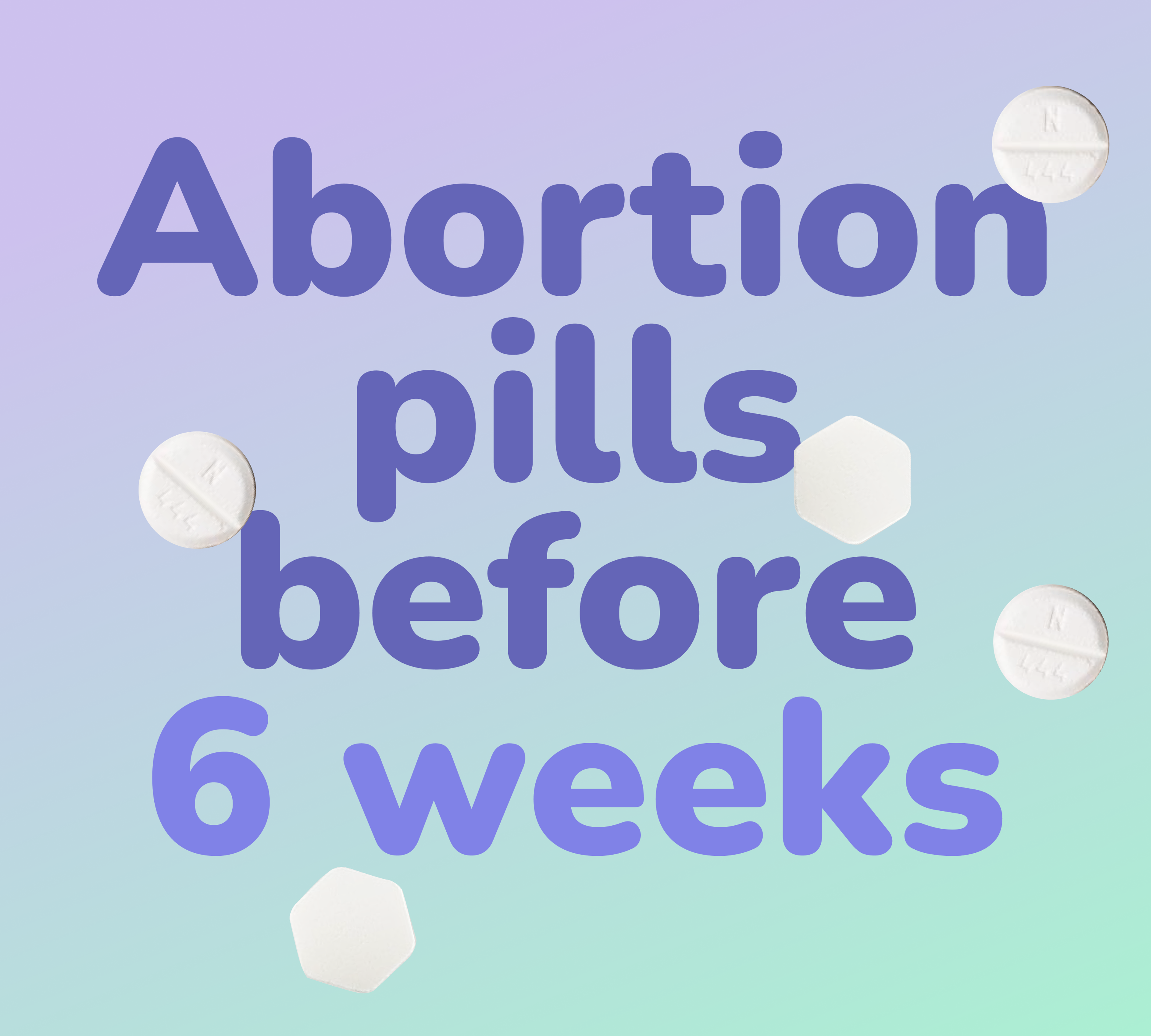
Many people take abortion pills when they are very early in their pregnancy, or less than 6 weeks pregnant. This experience might look different than one might expect!
You may read stories online about other people having very heavy bleeding, passing large clots, and having a lot of pain during their abortion. And if your experience doesn’t match that, it’s normal to be concerned it didn’t work
In reality, there is a wide range of normal experiences after taking abortion pills. Some people have heavier bleeding and some people have lighter bleeding. Every abortion experience is different.
We want you to understand the range of possible experiences so you can feel confident assessing if your abortion was successful!

What should I know about taking the pills before 6 weeks?
Abortion pills are very effective early in pregnancy.
Even early in pregnancy, abortion pills are still very effective in ending pregnancy. Some people may choose to wait until 6 weeks to take the pills based on some indications that the pills may be slightly more effective after that point. Some people may choose to take the pills earlier and not wait. Since both options are medically safe and effective, it’s up to you when to take the pills.
There are two medication abortion methods: the mifepristone + misoprostol regimen and the misoprostol-only method - both are medically safe and effective. You can check out the M+A Hotline’s protocol for both here.
You may not bleed as much as you expected to.
Before 6 weeks, the pregnancy is quite small. The gestational sac is smaller than a piece of Skittles candy. Because there can be less tissue in the uterus, there can be less bleeding, fewer clots, smaller clots, or no clots. It’s possible to only have ½ a pad-2 pads worth of blood and/or pass 1 single clot for the entire process and still have a successful abortion.
“When I do a procedural abortion on someone who is 4-5 weeks, oftentimes only 1-2 tablespoons of blood will come out.”
- Abuzz abortion provider
How do I know if it worked?
If your pregnancy symptoms go away within 1-2 weeks of taking the pills, this is a good sign that the pills worked. Fore more info on how to know they worked, check out this article.
If you’re unsure or have questions, you can always reach out to your provider or a provider at the M+A Hotline to talk through your options! Call or text 833-246-2632.
Rarely, having little or no bleeding after taking abortion pills can be a sign of ectopic pregnancy
An ectopic pregnancy (outside of the uterus) happens in less than 2% of all pregnancies. If it ruptures, it can be life-threatening. Abortion pills do not work to end ectopic pregnancies, but they do not cause an ectopic pregnancy to rupture.
If you think you’re pregnant and have extreme pelvic pain (especially on one side), bruising or swelling in the belly, dizziness, lightheadedness, or shoulder pain, these are signs of potential ruptured ectopic pregnancy, and you should go to the ER right away. If you go to get checked out, you never have to tell anyone that you took abortion pills.

We’ve tried to provide an overview of what to expect, but really your experience may vary. That’s why it can be helpful to read other people’s personal experiences. To help, here are some stories from people who got abortions before 6 weeks -
What It’s Like To Have An Abortion At Home
What a Medical Abortion Actually Feels Like
Demystifying Medication Abortion (video)
r/abortion: Medication abortion at 6 weeks, it was okay
r/ Abortion experience at 6 weeks
r/ My Medical Abortion Experience (4 week pregnant)
For more abortion stories, tagged by type of abortions, locations, demographics, feelings and more - check out ineedana.com/stories.
What if I go to the ER after an abortion or a miscarriage?
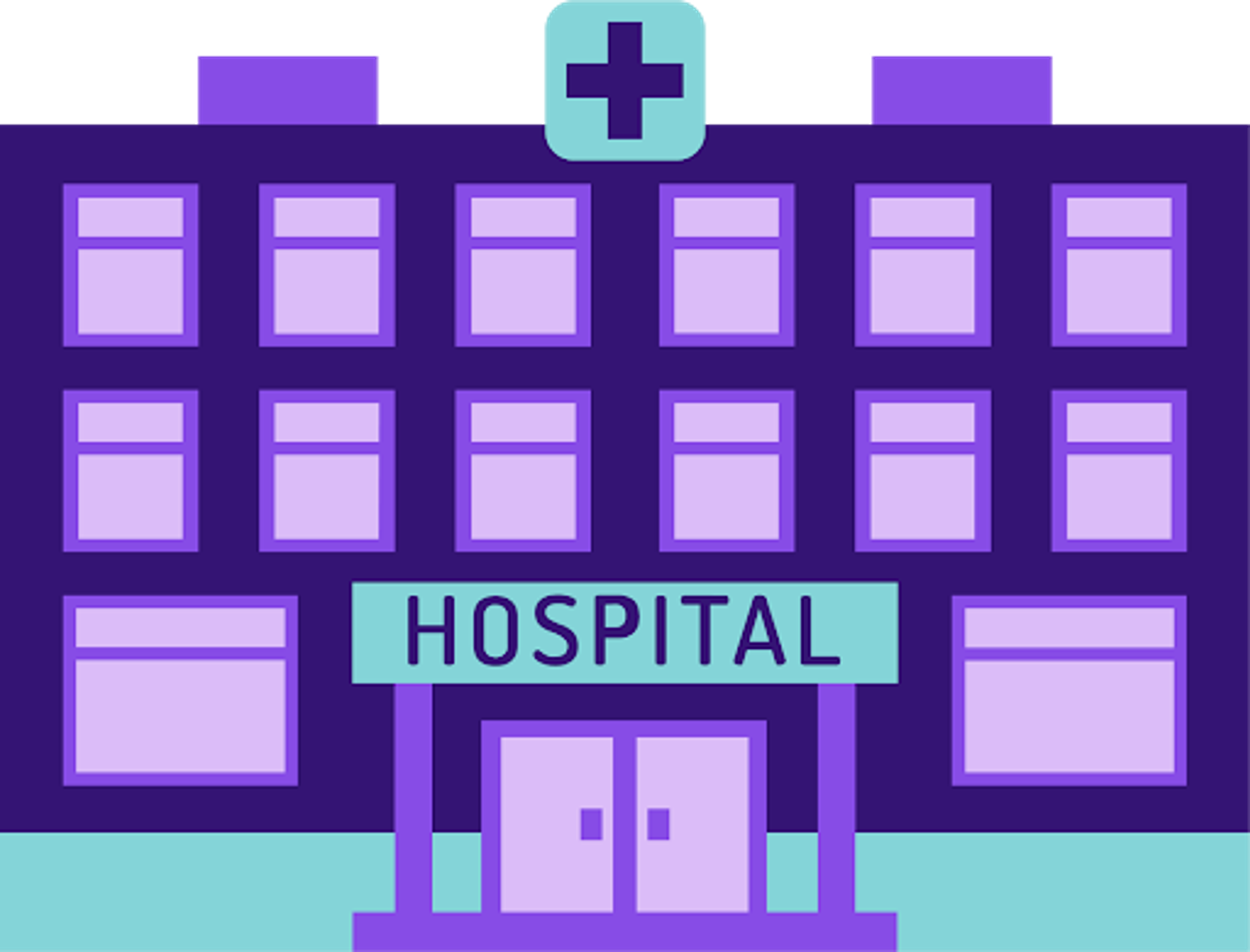

If you're having a medical emergency like very heavy bleeding, go to the emergency room closest to you.
You don't need to say anything about taking abortion pills or why you think you might be bleeding.
If you’re unsure of what’s normal or if you're having an emergency you can call or text Miscarriage and Abortion Hotline to talk with a medical professional at (833) 246-2632 between 8am - 1am ET daily.
If you are having trouble getting care at the hospital, you or your loved one can call the Repro Legal Helpline at (844) 868-2812 to speak with a lawyer.
Most people do not need emergency care after an abortion or miscarriage. Research shows that abortion is safe and complications happen in less than 1% of cases. And most miscarriages happen on their own without needing any medical support. Abortions and miscarriages are also the same process, so the medical treatment for both is the same. In fact, the medical term for a miscarriage is “spontaneous abortion” and usually refers to a loss before 20 weeks of pregnancy. You can read more about the similarities of medication abortion and miscarriage here.
You may be worried about getting into legal trouble for a pregnancy loss or worried if you’ll be able to get the medical care that you need. You aren’t alone! There is a lot of misinformation and fear around abortion care, especially depending on where you live. That’s why the Repro Legal Helpline and Ineedana.com teamed up to make sure that if you go to the ER after an abortion or a miscarriage, you will feel prepared.

Here’s what we want you to know:
- You have the legal right to get emergency medical care in an emergency room in every state, even if your state bans abortion. Emergency medical care includes treatment for a pregnant person in labor or having a miscarriage. You have this legal right no matter your age, immigration status, or whether you have insurance.
- You do not have to tell anyone about your abortion.
- You can bring someone you trust with you to the hospital so you don’t have to stand up for yourself alone. But keep in mind that hospitals can have different visitor policies.
- If you're bleeding a lot, you can say things like "I'm pregnant, I started bleeding and I'm very worried. I would like blood work and an ultrasound to figure out what's going on."
- You do not have to tell anyone what you want to do with a pregnancy, or if you change your mind about what you want to do.
- You have the legal right to travel between states for any reason and no matter your age, unless you’re under a court order like probation or parole. You don’t have to tell anyone why you’re traveling. No state makes it a crime for pregnant people to travel to another state for an abortion, but there can be reasons why traveling between states has legal risks. For example, your legal risk can depend on your immigration status. Call the Repro Legal Helpline at (844) 868-2812 if you’re not sure if you can travel.

How do I know if I need to go to the hospital?
- If you have very heavy bleeding and soak through more than 2 overnight maxi pads per hour for 2 hours in a row
- Running a fever of 101°F or greater
- A really foul smelling discharge with severe pain that isn't better with over the counter pain medications (like tylenol or ibuprofen), and fever are signs of an infection that should be treated immediately.
You can also call the Miscarriage + Abortion Hotline at (833) 246-2632 to discuss your symptoms—they can help you understand if you need medical attention. Check out this article for more information on what to expect when having a miscarriage.
What to expect at the hospital
You only have to share what you feel comfortable telling hospital staff. A healthcare provider only needs to know that you were pregnant, how far along you were (if you know), and what symptoms (e.g., bleeding, cramping, fever, etc.) you have. If you are more than 12 weeks pregnant, read more here. There is no law that says you have to tell anyone about having an abortion.
Unless you tell them, hospital staff probably will not know whether you had a medication abortion or a miscarriage.
Healthcare providers can't tell the difference between a medication abortion and a miscarriage by examining or testing you—the symptoms for both are the same. And if you need medical care after either, doctors will usually treat them in the same way.
When misoprostol is dissolved under the tongue or between the cheek and gum, and any leftover pieces are swallowed or spit out, doctors won’t be able to see the pills. But if misoprostol is placed in the vagina, a doctor might notice any leftover pill during an exam. That’s why many people prefer to take the pills by mouth.
You can read more about how to talk to a healthcare provider here.

What do I do if I go to a hospital and they refuse to help me?
Call Repro Legal Helpline at (844) 868-2812 or contact us through our secure online form to speak with a lawyer. Tell us that you’re being denied emergency medical care and we’ll get back to you immediately.
We encourage you to bring a friend or family member with you to the hospital, because you may be in a situation where you need to advocate for yourself. It’s hard to do that alone if you’re scared or in pain.
You, or your trusted person, should write down (on paper or in a Notes app on your phone) everything that happens, including:
- The name of the hospital
- Any treatment you are offered and/or receive
- What the hospital staff says to you and any reasons they give about why they will not treat you
- The names of the nurses, doctors, or other staff you talk to
- The date and time you arrived and left the hospital
We recommend you write or use your Notes app instead of recording at the emergency room, because some states do not allow people to record others without their permission.
You or your trusted support person should also call the Repro Legal Helpline (844-868-2812) as soon as possible. If you do not have someone with you that you trust, you can ask the hospital for a patient advocate. Keep in mind that a patient advocate is not a lawyer and everything you tell them will be written down and kept by the hospital.
If you feel comfortable, you can:
- Ask why you are being denied care and that they put their reason in your medical chart
- Tell them: “I have the right to stabilizing medical care under the Emergency Medical Treatment and Labor Act (EMTALA).”
- Ask the hospital to transfer or transport you to another hospital that will provide you care that you need
- Ask how to request your medical records, including a copy of labs and imaging, and to sign up for the online patient portal, like MyChart, if you haven’t already
Make sure to write down in your notes that you asked these questions and their answers.
If you forget to take notes, or can’t, that’s okay. When the emergency is over, you can write down everything you remember, or call the Repro Legal Helpline (844) 868-2812 and tell us what you remember. The Repro Legal Helpline is free and confidential.

What do I do if the hospital calls the police?
Do not talk to the cops
Tell the police that you will not talk to them without a lawyer present. It is always better for you, no matter what, to talk to a lawyer before you answer questions from a police officer. You have the right to remain silent, or to have a lawyer with you if you do answer any questions. After you refuse to talk to the police without a lawyer, call or have a loved one call the Repro Legal Helpline at (844) 868-2812 immediately. Be sure to tell Repro Legal Helpline that you’ve been contacted by the police and include a phone number where you can be reached.
You may need to be careful about talking to anyone at the hospital
Hospitals are not supposed to share your private medical information with the police. But, sometimes doctors, nurses, or other hospital staff may do that anyway, and people who work with cops, like a social worker or child protective services worker, might try to question you too. Any of those people might tell the police what you say. You don’t have to talk to them. You can always say, “I’m not comfortable answering your questions and I want to talk to a lawyer first.” then contact the Repro Legal Helpline.
Learn more about your rights when contacted by police, immigration, or CPS here.
If you’re a medical professional:
You are not required to give or facilitate police access to your patients, especially if doing so will put your patient’s condition at risk. You can:
- Ask to see a warrant
- Tell your patient they have the right to remain silent and talk to a lawyer first
- Stay with your patient if police insist on questioning them.
As you know, HIPAA protects all medical care, and there are special protections for sexual and reproductive health care. And in many states, state medical privacy laws are even more protective. For these reasons, it would be very unusual for you to need to report the fact of a self-managed abortion to child welfare, immigration authorities, or police, and doing so is often a HIPAA violation.
If you’re a healthcare provider with questions about reproductive healthcare including miscarriage or abortion, you can call the Reproductive Health Hotline staffed by UCSF clinicians at (844) 737-7644.
If you have questions about the law, you can contact If/When/How or, if you need specific legal advice, you can contact the Abortion Defense Network. You can also contact the Repro Legal Helpline on behalf of your patient if you believe that your patient is being denied emergency medical care or the hospital has reported your patient to the police. Learn more about how you can interrupt criminalization as a healthcare provider here.
If you’re a doctor in an emergency department, you can also check out Access Bridge’s protocol and learn about how to ensure patients receive the reproductive healthcare they need.

Are some emergency rooms better than others?
Not everyone has a choice of more than one hospital. You might live near only one hospital with an emergency room. Or you might have insurance that pays for only certain medical centers. Even if you have only one option, that emergency room has to take care of you in a medical emergency.
If you have more than one hospital option and want to be prepared in case you ever need to go to the hospital, it can be helpful to do some research ahead of time. You can call hospitals or doctor’s offices and try asking:
"Hi, I’m calling to get some information about miscarriage management at your hospital. Can you connect me with someone who can answer questions about hospital policies and available treatment options?"
- (You may need to ask for Labor & Delivery, the Emergency Department, or a patient advocate.)
"Can you tell me about your hospital’s miscarriage management guidelines?"
- (If they seem unsure, you can clarify: “I’m specifically asking about how early pregnancy loss is treated and whether there are standard protocols in place.”)
"When a patient is experiencing a miscarriage, are doctors expected to go over all three management options—watch and wait, medication, and a procedure?"
- (Follow-up: “Will the doctor allow the patient to choose their preferred treatment, or are there restrictions on certain options?”)
"Does your hospital have doctors who are trained in D&E (dilation and evacuation) procedures? Are any of them fellowship-trained in Complex Family Planning?"
- (If they don’t know, ask: “Is there someone in OB/GYN I can speak to who might know?”)
"If a patient needs a higher level of care or a procedure your hospital doesn’t provide, what is the process for transferring them to another facility?"
- (Follow-up: “Does the hospital have any policies that could delay or prevent a transfer?”)
"Is your hospital Catholic-affiliated or connected to a religious system that restricts miscarriage or abortion care?"
- (If they seem unsure: “Do your hospital policies allow for miscarriage management even if there is still a fetal heartbeat?”)
Keep in mind:
- It may be hard to get someone on the phone or even have these questions answered by hospital staff. You can try connecting with a local pregnancy/birth doula who may have a better idea on hospital policies and people’s experiences too.
- In some communities the only available hospital or healthcare providers available are religiously affiliated (i.e., most likely anything with “St.” in the name)
- Some people live in very small towns where everyone knows everyone and it’s hard to keep things private.
And remember, you know your community and where you live best and how providers may react.
If you’re not experiencing a medical emergency and just want to get checked out after a miscarriage or abortion, you do not have to go to the emergency room. You’re already in the right place to find trusted medical providers who offer abortions.
Find trusted providers that can help with miscarriage management
Loved this article?
Share our latest Instagram post with your friends and spread accurate information!
A Sex Worker's Guide to Navigating Abortion

This is a guide for sex workers from sex workers on how to navigate abortion. We teamed up with the baddies at SWOPLA who run the Sex Workers’ Abortion Navigation Services (SWANS) to create this guide that offers a supportive, sex worker–informed perspective on accessing abortion.
[Not a sex worker but want to know more about what sex work is? Click here]
Abortion is a deeply personal decision—one that can bring up a lot of emotions, questions, and considerations. For sex workers, the reality of navigating abortion care can be even more complex because of ongoing stigma and the criminalization of sex work in many parts of the U.S. We recognize that every experience is unique; our goal is to provide you with the knowledge and resources you need to make the decisions that are best for you.
What does abortion access look like right now?
There are three types of abortions; in-clinic abortion, medication abortion and self managed abortion. All are proven safe, but how easy they are to get really depends on where you live. Some states make it easier to access in-clinic abortions or abortion pills, while others have banned abortion entirely (however, pills by mail is always an option no matter where you live!). Ultimately, you know what’s best for your life—whether that means going somewhere in person or getting pills mailed to you.

What do I need to consider if I’m traveling for an abortion?
Most people have the right to travel between states—unless they are on probation, on parole or under some form of state surveillance. Read more about deciding to travel for an abortion.
If you travel for an abortion—especially if you live in a highly restricted state—or for work, there are additional considerations for sex workers. While there aren’t any federal laws criminalizing sex work itself, there are federal policies that indirectly target sex workers:
- Laws such as the Mann Act and the Travel Act can target sex workers, even when traveling across state lines for unrelated reasons (e.g., seeking medical care).
- Sex workers who are non-U.S. citizens, undocumented, of immigration status, and/or more likely to be racially profiled may face extra risks when crossing state lines. You never have to tell TSA, border agents, or cops why you are traveling. Check out this informative post: “Know Your Rights”.
- The Trafficking Victims Protection Act (TVPA) was designed to protect trafficking victims, but its broad language allows law enforcement to conflate trafficking with consensual sex work. This can lead to raids and arrests of sex workers, criminalizing them, increasing their vulnerability to abuse, and limiting their access to essential services and resources.
- Be mindful of what you share on social media or through text/email about your plans, and consider taking extra steps to secure your devices and data.
If you have specific legal questions, resources like the Repro Legal Helpline can offer guidance. Call (844) 868-2812.
… and if you need support, reach out to SWOPLA’s Sex Workers’ Abortion Navigation Services (SWANS) by texting (657) 549-4556 or emailing swoplaswans@proton.me.

How can I make sure my information is kept private and confidential during an abortion appointment?
Abortion providers, like all medical professionals, are required by HIPAA (the Health Insurance Portability and Accountability Act) to keep your information private. No one can join your appointment unless you explicitly agree to it. If you have health insurance and someone else is the policy holder (e.g., spouse, parent, guardian), they may see certain billing information. However, if you choose to self-pay, pay out-of-pocket, or receive funding from an abortion fund, your records will remain private.
Do I need to tell the doctor I’m a sex worker?
Nope. You are never legally required to disclose your employment status to a healthcare provider.
If you do disclose, watch out for possible red flags. Examples include the provider conflating sex work with sex trafficking; blaming your work for unrelated health issues; pressuring you to leave your profession; assuming that you use/abuse alcohol or substances; and/or asking inappropriate, intrusive questions about your sexual history. If you experience any kind of discrimination, you have the right to file a grievance with the healthcare facility or a complaint with your state medical board.
At the clinic, they may question you about your job. If you don’t want to disclose your sex work, you don’t have to! You can make up another profession, say you do gig work, or whatever else feels right to you. Remember, you are allowed and encouraged to set boundaries during your appointment—apply the same skills you use with your clients to keep the appointment focused on your health and not on personal details that don't matter for your healthcare.
How can I make sure my information is private when booking a place to stay?
If you're worried about sharing your ID or other identifying information when booking lodging, consider these tips. First, check Vrbo for places that offer lockboxes or coded entry so you can stay contactless—a feature that's especially helpful if someone else is booking the Vrbo for you. Additionally, consider using an alias, as some hotels don't require ID at check-in.
Programs like SWANS can help you find confidential booking!

What things should I prepare for before and after my abortion?
Plan for time off
If you are a full-service or in-person worker, you may need a few days or more to rest before returning to your routine. If you work mostly online, try to set up some posts ahead of time using social media scheduling tools while you recover.
Financial planning
Do you have a client that might be more open to virtual options, such as digital content, phone sex, or sexting? Consider other platforms or services you can offer that may be more comfortable while you care for yourself.
Talking to clients
You NEVER have to disclose why you aren’t able to take clients in person or aren’t available on certain days. You should never feel pressured to share the abortion with a client.Let your regulars know in advance that you'll be on vacation and have content ready to share! This is especially helpful if you do a variety of sex work. If you're traveling out of state, consider reaching out to that generous client to book you before you leave.
Need an extra boost after missed wages? Chat with SWANS to see how we can help!
Take care of yourself and monitor your symptoms
It’s common to experience cramping and bleeding for a couple of weeks. Use pads to monitor bleeding (you can have bleeding and spotting for up to 2-6 weeks). Heating pads or a warm compress can help ease the pain of cramps. You may feel relief, sadness, anxiety, joy, or a mixture of emotions. All feelings are valid, and professional or peer-based support can help. Many sex workers build strong communities, so don’t hesitate to reach out to trusted friends or sex workers–led organizations (SWOPLA has support group offerings - reach out to services.swopla@proton.me)
Returning to work
Some doctors recommend avoiding putting anything in the vagina—tampons, penetrative toys, or sexual activities—for at least one week to prevent infection. However, there is no evidence of this increasing your risk of infection. You know your body best so do what feels most comfortable for you.
If you choose to return to in-person work sooner, some sex workers use makeup sponges or specially designed products like Beppy sponges to prevent bleeding. You can have sex with a sponge—there’s no string visible, the client won’t feel it, and it can be softer and more comfortable. If you do have heavier bleeding again, switch back to pads because it’s a better way to monitor. If you’re filling up 4 overnight pads in 2 hours, it could be a sign that you’re hemorrhaging and you may need to go to the hospital.
It’s common to ovulate again within 1-4 weeks after an abortion, so the chances of getting pregnant again are possible, even if you’re still bleeding. Some people may lactate after their abortion. It's more common if an abortion happens after 14-16 weeks but it can also happen earlier in pregnancy. Abortion providers who are providing abortions in the 2nd trimester often give medication to help prevent this, but not always (you can definitely ask them about it!).
The Miscarriage and Abortion Hotline is always available to talk with a volunteer doctor about your symptoms. Call or text (833) 246-2632.

I don’t have anyone to talk to about this..
As a sex worker, sharing your decision to have an abortion can feel especially vulnerable. Focus on what feels right for you—whether it’s asking for support or simply telling loved ones. Choose someone you trust and set boundaries around what you’re comfortable sharing about your work and decisions. It’s okay if their reaction isn’t what you expected or hoped for. Prioritize your safety and emotional well-being. Reach out to your local SWOP chapter for support groups (Can’t find one? Ask us!).
SWANS is creating community support for sex workers who have had abortions—reach out to us!
What if I’m worried about needing an abortion in the future?
If you aren’t pregnant now but want to be prepared if you ever are, there is advanced provision of abortion pills. Which means you can order pills before you’re pregnant, so you have them in case you are pregnant in the future.
Wanting more 1-on-1 support?
I Need An A and SWANS want you to feel supported and cared for! While stigma and legal obstacles may make the journey complicated, it’s important to remember you are not alone. There are organizations, hotlines, and fellow sex workers who understand your circumstances and are ready to help! Whether you choose a self-managed abortion, an in-clinic procedure, or something in between, you deserve compassionate, respectful care—without having to compromise your safety or privacy.
Contact SWANS. They provide not only financial aid and trauma-informed peer support for those seeking an abortion, but also flights, hotels, meals, missed wages, and assistance booking and scheduling appointments and travel. This service is FOR sex workers, BY sex workers. You do not have to live in California to receive aid.
- Repro Legal Helpline: get legal questions answered
- M+A Hotline: get medical questions answered
- Reprocare: peer support hotline for people using pills
- SWOP-LA & SWANS: financial, travel, and peer support for sex workers
- All-Options: pregnancy counseling and emotional support
- Digital Defense Fund: online tools to keep you safe
Everybody deserves safe & accessible abortion care! #sexworkiswork
Loved this article?
Share our latest Instagram post with your friends and spread accurate information!
Miscarriage Fact Sheet
Miscarriages can be incredibly heartbreaking and relieving — there’s no “right” way to feel. They are also incredibly common and normal.
What are normal symptoms of a miscarriage?
- Heavy bleeding
- Passing small or large clots or some gray or white tissue
- Cramps or abdominal pain
- Back pressure or pain
- Nausea and/or vomiting
- Diarrhea
These symptoms can range from minor to severe and could last a few days or weeks.
**** many people pass their miscarriages on their own without medical intervention ****
*Spontaneous miscarriages and taking abortion pills can look and feel very similarly. The symptoms, potential complications and treatment for complications can look the same, too. There is no way for a doctor to know if you had taken abortion pills or had a spontaneous miscarriage.
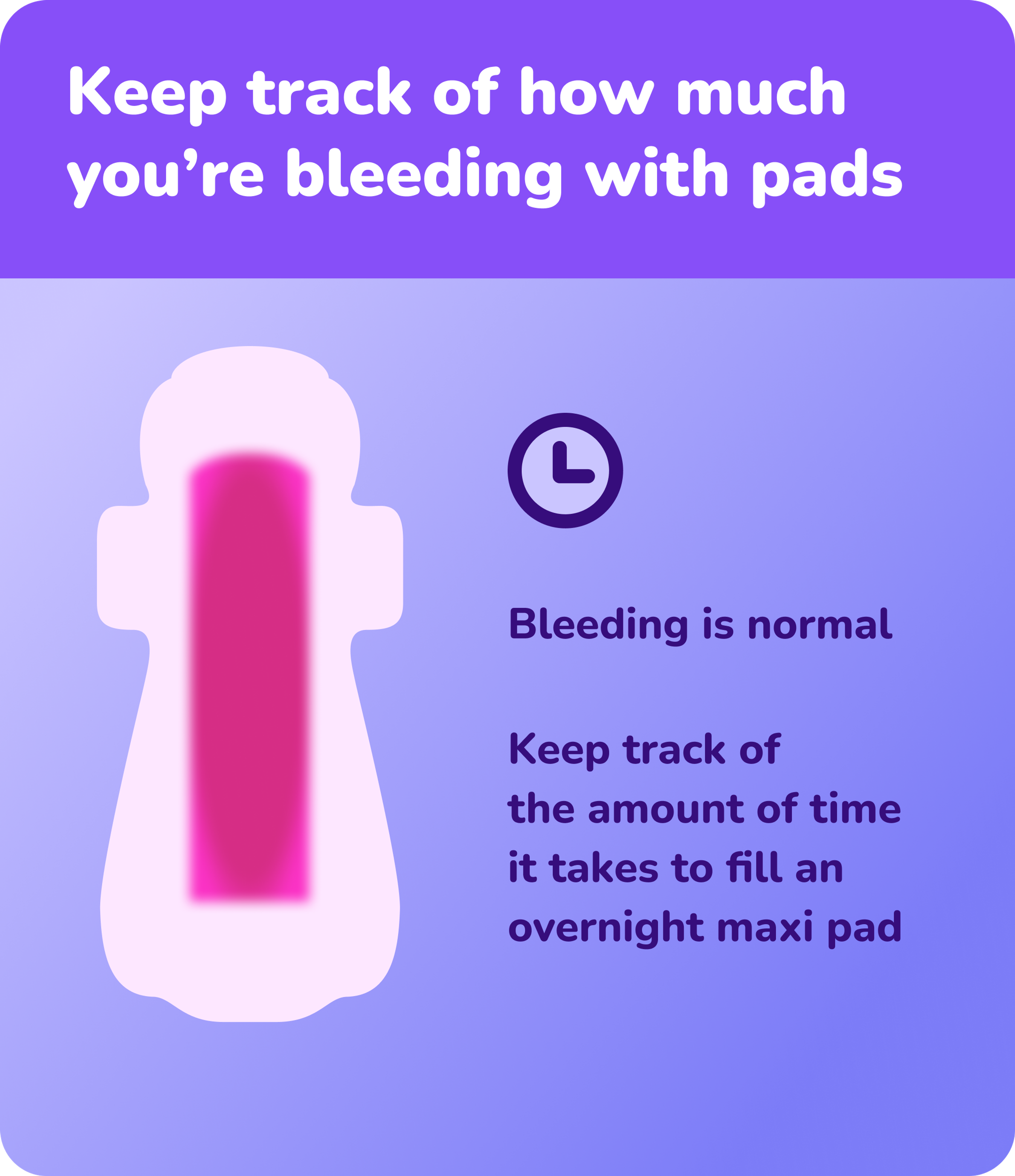
When is it an emergency?
- If you have very heavy bleeding and soak through more than 2 overnight maxi pads per hour for 2 hours in a row (make sure you are tracking your bleeding by what’s on the maxi-pad and not what’s in the toilet.)
- Running a fever of 101°F or greater
- A really foul smelling discharge + severe pain that isn't better with over the counter pain medications (like tylenol or ibuprofen). These (in addition to a fever) are also signs of infection and should be treated immediately

What do I do if I’m having an emergency?
Go to your OBGYN or the emergency room.
What are my options for treatment during a miscarriage?

1. Watch and wait
Wait for the pregnancy tissue to pass. The uterus will contract on its own and push the pregnancy out.
- Being aware of the potential emergencies + symptoms we listed above.
- Monitor your bleeding with overnight maxi pads
- Take ibuprofen and use a heating pad for cramps
- Monitor your temperature with a thermometer
- Monitor how your body feels and make sure your pregnancy symptoms are going away within a few days.
Note: If you are over 12 weeks and your blood type is RH(D) negative, you should talk to a doctor about getting the injection of RH(D)-immune globulin —also known as Rhogam—within 72 hours to protect future pregnancies.

2. Medication
Doctors can prescribe Mifepristone and misoprostol (the same pills used for a medication abortion) to take at home that induce a miscarriage and empty the uterus. Using misoprostol only is also an effective option for miscarriage management. Read more about the medication process here. If you live in a state where abortion is severely restricted, they may not provide these pills.

3. Procedure
If the pregnancy was less than 12 weeks, a doctor may remove the pregnancy tissue using an in-office procedure, called vacuum aspiration. The cervix is dilated and a gentle suction is used to remove the pregnancy. Typically, sedation can be used to help with pain management. Read more about the procedure here. If you were in the second trimester or later, the procedure would likely be a longer process.
If you live in a state where abortion is severely restricted, you may find physicians hesitate to provide the health care you need.

If you’re unsure of what’s normal or have medical questions you can call or text Miscarriage and Abortion Hotline to talk with a medical professional at (833) 246-2632 between 8am - 1am ET daily.
You or a loved one can also call the Repro Legal Helpline at 844-868-2812 to speak with a lawyer. Tell them that you’re being denied emergency medical care and they'll get back to you immediately.
If you’re not experiencing a medical emergency and just want to get checked out after a miscarriage or abortion, you do not have to go to the emergency room. You’re already in the right place to find trusted medical providers who offer abortions!
We also have a database of providers in heavily restricted states where you can get ultrasounds, pregnancy tests, post abortion care and miscarriage management without fear of judgment or threats.
Find trusted providers that can help with miscarriage management
Loved this article?
Share our latest Instagram post with your friends and spread accurate information!
Release Notes #6
Taking Abortion Pills After 12 Weeks
We are excited to share our new article in partnership with Abuzz that offers comprehensive information about safely and effectively using abortion pills after 12 weeks.
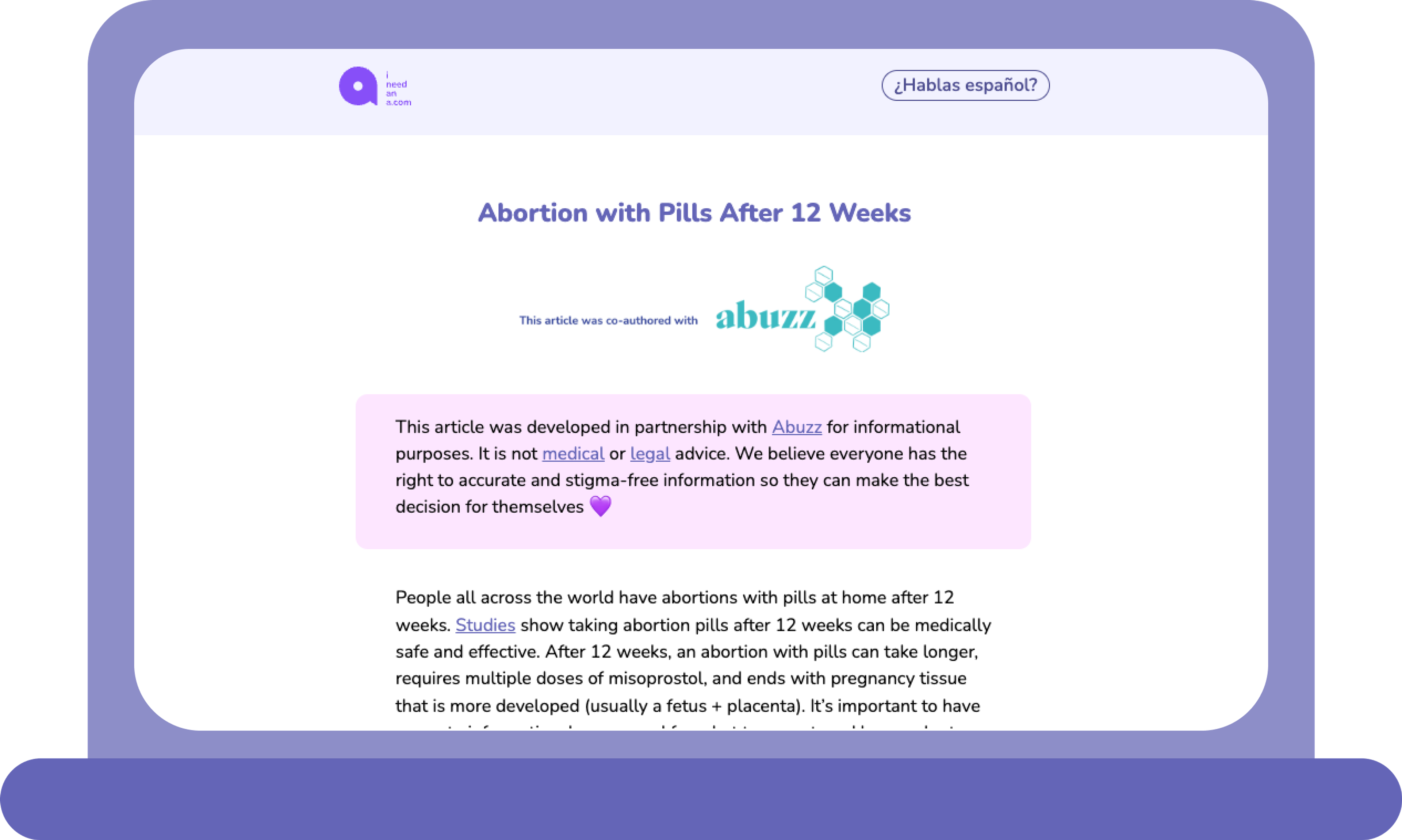
Read Abortion Pills After 12 Weeks here.
This resource is not medical or legal advice; it’s meant to empower abortion seekers with knowledge so they can make informed decisions that feel right for them. Below is an overview of what’s included in this resource, why we created it, and how it can support you or someone you know.
This article contains:
- Evidence-based data
- Legal considerations and privacy tips
- Step-by-step guidance
- What to expect and how to prepare
- Visual aids
- Practical resources
Why This Article Matters
Many U.S. providers cap medication abortion around 12 weeks, but research and real-world experience confirm safety beyond that point. Our goal is to get rid of the shame around abortion and replace it with knowledge that allows people to choose the right path for themselves. In addition to medical facts, we offer emotional and legal support recommendations so no one feels alone.
If you know someone who might need this information, consider passing it along. We welcome questions and suggestions at ineedana@protonmail.com.

But don’t just take our word for how great this article is, check out what our partners say:
“We talk to people everyday who are confused after looking for information about abortion on the internet. Ineedana’s post about medication abortion after 12 weeks fills a major gap in accessible information, and importantly is part of a website with robust, direct information on how people access care in a clinic or at home.”
- Reprocare
"Everyone deserves information and support no matter their zip code or how many weeks pregnant they are. There is very little accurate and supportive information on the internet about how to have a safe medication abortion after 12 weeks, including what to expect and where to get support. This is vital and life saving information that people deserve access to so that they can determine for themselves what is best for their lives and have reproductive and bodily autonomy."
Thank you for reading and for being part of a community that values accurate, stigma-free health information!
Your 2025 Abortion Prep Checklist
Feeling that inauguration dread?
Ditto. You're not alone.
But there are things we can all do to prepare in case we or someone we love needs an abortion in 2025.

#1 Share up-to-date abortion information
People will always need and get abortions. You can help them by making sure you share accurate and comprehensive info about your closest clinic, pills by mail options, support organizations, and laws. I Need An A is the most comprehensive and user-friendly resource for you and the people you love to find all of that info. You can help us get the word out by sharing a post on social media or putting up stickers around your town.
We've also launched a new "quick-start" hub of resources with our friends at Shout Your Abortion, Plan C, and Charley at YouHaveOptions.com. The goal of this new page is to be an easy-to-remember website that can be part of a bigger cultural-awareness campaign.

#2 You can order abortion pills by mail before you need them
No matter what state you live in, there are telehealth providers that will mail you abortion pills in advance. Sometimes they call this "advanced provisioning." Abortion pills are medically very safe to take on your own and don't expire for years if they're stored in a cool, dry place.
You can find more info on getting abortion pills in advance at YouHaveOptions.com

#3 Get plugged in locally
We’re going to need community more than ever. Find your local abortion fund and practical support organizations on our newly re-launched Support Organization Hub.
This page includes all members of National Network of Abortion Funds, members of Apiary for Practical Support's Hivemind, and more! All organizations have been verified and will be regularly reviewed. We hope it will be an easy place for you to learn how to donate to them, volunteer with them, and contact them if you need an abortion.
Finally, take a deep breath.
It's unlikely that abortion access will get easier in the next 4 years, but people will keep having abortions. In fact, data shows that more people are getting abortions now than we did before the overturn of Roe v. Wade.
A quick data sample from Mississippi:
Before the overturn of Roe v. Wade, there was one clinic in the entire state. In 2017, there were 2,550 abortions provider in the state. Between April 2024 and June 2024, The Society of Family Planning found that an average of 390 abortions happened each month in the state via "shield providers." If we do the math, that would mean we would expect there to have been 4,680 abortions - almost 2x more - in Mississippi in 2024.
We believe that's due to three things
- Pills by mail are more accessible in every state thanks to telemedicine and "shield laws."
- Abortion funds & support organizations are and will continue to perform heroics to ensure people get care (that's why we need to support them!).
- Information is more easily accessible thanks to people like you are sharing I Need An A 💜
Each of these facts gives us confidence that together we'll be able to keep helping people get the abortions they want, need, and deserve in 2025 and beyond.
Comparing the Different Ways to Get Abortion Pills in Restricted States

Abortion seekers in banned and restricted states have two ways to access abortion care:
- Get abortion pills by mail (through licensed telehealth clinics, community networks, or websites that sell pills).
- Travel to a state that allows abortion to get pills (to take at home) or an abortion procedure (in clinic).
Below we’ve outlined some basic descriptions of getting abortion pills by mail to help you understand the type of support that’s offered and generally, where the pills are coming from.
Online clinics
Description
US-licensed clinicians who mail pills to patients after a brief online form or phone/video visit
Cost
$0 to $150
Financial aid
Providers often give discounts if you ask
Gestational limits*
Most up to 13 weeks
Medical support
Provided by clinicians
How to order
Online form and email
Under 18
Depends on the provider. Several online clinics will mail to people under 18.
What is provided?
The FDA approved medications. Original product packaging.
Delivery time frame
1-5 days
Community networks
Description
Community volunteers that mail generic abortion pills and provide text-based accompaniment
Cost
$0
Financial aid
Free service
Gestational limits*
Up to 13 weeks and beyond
Medical support
Provided by volunteers
How to order
Online form, email, or messaging through Signal
Under 18
Yes
What is provided?
Generic pills manufactured overseas. May be repackaged in small, unmarked bags/packets.
Delivery time frame
5-10 days
Websites that sell pills
Description
E-commerce sites that mail pills
Cost
$30 and up
Financial aid
None
Gestational limits*
None listed
Medical support
Not provided
How to order
Online checkout
Under 18
Yes
What is provided?
Generic pills manufactured overseas. Original manufacturer’s blister packaging.
Delivery time frame
3-6 days
In-person care
Description
Travel to a clinic in another state
Cost
$600 on average
Financial aid
Assistance may be available through clinics, abortion funds and insurance.
Gestational limits*
Varies by state and clinic
Medical support
In person during the appointment. Follow up care may be limited if patient returns to a restricted state.
How to order
Schedule an appointment that may require in person testing and/or ultrasound.
Under 18
What is provided?
The FDA approved medications. Original product packaging.
Delivery time frame
Depends on scheduling, travel distance, and state waiting periods
*Studies show taking abortion pills after 12 weeks can be safe and effective. At this length of pregnancy an abortion with pills can take longer, requires more medication, and ends with pregnancy tissue that is more developed (usually a fetus + placenta). Read more about taking abortion pills after 12 weeks.
Ready to order pills?
Because information changes frequently, check options specific to your location:
Explore all of your abortions options side by side by your location at Ineedana.com
Or if you know how you’d like to receive abortion pills you can filter by your state at Plan C Guide.

Worried about legal risks?
Repro Legal Helpline offers free and confidential legal services.
Need to talk to a doctor?
M+A Hotline has medical professionals available to talk by phone or text.
Want support while taking abortion pills?
Connect with trained peer counselors at Reprocare or Aya Contigo.
Loved this article?
Share our latest Instagram post with your friends and spread accurate information!
What if I go to a crisis pregnancy center aka a “fake clinic”?

What are crisis pregnancy centers aka “fake clinics”?
Crisis pregnancy centers (sometimes called pregnancy resource centers) are anti-abortion religious organizations that try really hard to seem like a normal doctor’s office.
The reality is that crisis pregnancy centers (or what we tend to call “fake clinics”) are heavily biased and their main goal is to talk people out of having abortions. They’ve been known to give wrong and misleading information about how long you’ve been pregnant. They’ve been known to lie about how abortions can change future fertility or cause breast cancer.
Tactics they use:
- Over-emphasizing the dangers of abortion (when in fact science shows us that abortion is very very very safe and doesn’t have long term negative effects on physical or mental health)
- Presenting adoption as the best option for someone who doesn’t want to parent
- Promising money or other things like diapers if you choose to parent
- Calling you multiple times after you visit to come back for follow up appointments
- They often co-opted abortion clinics’ website designs and language to make it look like they’re the same, and are often right next door to actual medical providers and abortion clinics. Sometimes it’s even hard for us to tell right away!
You can see some of their lies and anti-abortion tactics first hand here and here.
How to spot a fake clinic
Typically, crisis pregnancy centers advertise free ultrasounds and are located in a church or their website only talks about prenatal care and adoption. You can check to see if the clinic you’re planning to go to is listed as a fake clinic so you’re prepared (and they aren’t just located in states with strict abortion bans, there are plenty in states like New York and California):

Why do people go to these fake clinics?
- They aren’t sure how long they’ve been pregnant which is making it hard to decide what type of abortion is right for them and the fake clinic offers free ultrasounds (learn how to calculate!)
- They aren’t totally sure they are pregnant and the fake clinic offers free pregnancy tests (note: dollar store tests are very accurate, see more below)
- They want to talk to someone to learn more about abortion options (Talk to someone at Reprocare)
- They aren’t sure if they want an abortion or not (Check out All-Options)
Pregnancy Test Facts
First, know that cheap 2-line pregnancy tests from the store are very accurate. If it has been 21 days since you’ve had sex and you’ve taken a test and read it at the correct time, the result is over 99% accurate. If you are unsure, repeat the test the next day.
It is not medically necessary to “confirm” a positive or negative test by going to a clinic. Clinics do not have any special urine pregnancy tests and use the same type of tests you can buy at the store.
What should I know about “fake clinics” if I decide to go to one?

Where can I find better places to go for pre and post abortion care?
You’re already in the right place! Ineedana.com keeps a list of trusted medical providers who offer abortions. We also have a database of providers in heavily restricted states where you can get ultrasounds, pregnancy tests, post abortion care and miscarriage management without fear of judgment or threats.
Find ultrasound providers near you
If you need an ultrasound and are in a state with abortion restrictions, here are some trusted providers that can help you.
If you go to your primary care provider or obgyn..
They can likely order an ultrasound for you if you really don’t know when your last period was or you’ve had some weird bleeding or think you’re still pregnant after an abortion. You do not need to tell them you are considering an abortion or had an abortion. You can simply call them or send a message on your patient portal to let them know you had a positive pregnancy test and have irregular periods or bleeding and want to know how many weeks pregnant you are or know if you had a miscarriage. After you get your ultrasound you don’t need to follow up with them further if you don’t want to.
Another alternative are Title X and Federally Qualified Health Centers.
They may not provide abortion care themselves, but they often provide free or very discounted care to people with and without insurance (just ask about financial assistance when you make the appointment).
And if you have questions about abortion before, during or after, reach out to the Miscarriage and Abortion Hotline to talk with a volunteer doctor. Call or text (833) 246-2632
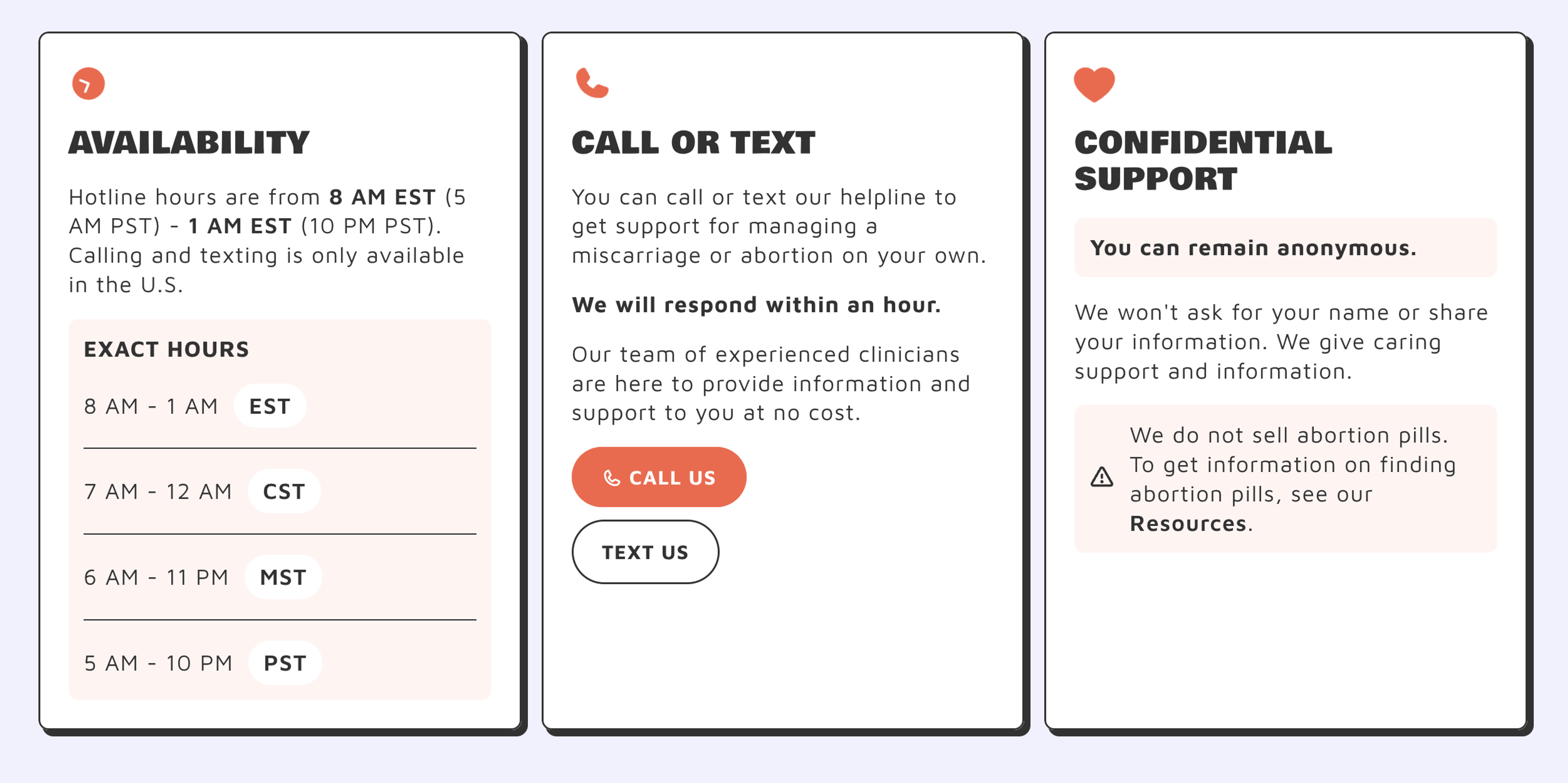
We want to acknowledge this isn’t fair or okay. You should be able to go to a trusted abortion clinic in your neighborhood to get accurate information but in the U.S. and especially in abortion restricted states, that’s not always an option. You absolutely deserve better. We will keep fighting for access but don’t forget that ineedana.com and the M+A Hotline always have your back <3
Smoking Weed + Taking Abortion Pills

Can I Smoke Weed During a Medication Abortion?
Yes, you can smoke weed or take an edible during a medication abortion. Smoking weed will not affect how the pills work. In a study on pain management during abortion, all participants who used marijuana said it was at least somewhat effective at relieving pain and cramps.
"People may experience a wide variety of symptoms during a medication abortion including anxiety, nausea and pain. At the M+A Hotline we often have people ask us if they can use marijuana during the process and we give them accurate medical information. It is safe, recommended and doesn’t affect how the abortion medications work to use multiple options to help improve these symptoms. Over the counter medications like 800mg of ibuprofen along with marijuana and taking a bath while having a medication abortion can help improve symptoms during the process."
- Medical Director of the M+A Hotline
What should someone know about getting high during the abortion?
- Weed can help with nausea as well as cramping.
- Indica strains might be a better choice than sativa, as they tend to be more relaxing.
- Write down how often you’re changing pads and any other symptoms, just in case you do need to call the M+A Hotline you don’t have to think too hard ;)
- Don’t rely solely on cannabis for pain management—make sure you have other pain relief options on hand like Ibuprofen (advil/motrin), Acetaminophen (tylenol) and a heating pad.
You can take these pain relievers two different ways:- Take 800mg Ibuprofen with 1000mg Acetaminophen every 6- 8 hours as needed for pain (it is safe to take the medications together as they work differently).
- Take 800mg of Ibuprofen every 6 hours. In between doses of Ibuprofen take 1000mg Acetominophen every 6 hours. This looks like: take 800mg ibuprofen, wait 3 hours, take 1000mg acetominophen, wait 3 hours and keep repeating.
(Ibuprofen has been shown to work better than acetaminophen for cramping pain during the process, so if you only take one, ibuprofen is recommended!)
You don’t want to be so high that you can’t stay alert.
While complications with abortion pills are super rare (less than 1% of the time), they can happen. You’ll need to monitor how much you’re bleeding, keep an eye on your temperature, and be able to communicate with a healthcare provider if something feels off. The M+A Hotline is a great resource if you need to reach a doctor and have more questions — they've heard it all!
Everyone’s experience with a medication abortion is different. Some people have mild cramping, while others experience more intense pain. Both are normal and so is everything in between. The goal is to get as relaxed as possible: put on your coziest PJs, gather up some snacks and water, snuggle into a blanket, put on your favorite show, and if you want, light up a joint or take an edible. If you end up falling asleep, even better!
What about smoking weed after an in-clinic abortion?
It’s also safe and a great tool to use for pain management after the in-clinic abortion! However, on the day of your procedure you need to have a clear mind to sign consent forms so getting high before your appointment isn't recommended. If the doctor or clinic suspects you’re under the influence of any drugs, they will probably make you reschedule your appointment.
If cannabis helps you feel more comfortable and relaxed, go for it! Just make sure to stay in tune with your body and be prepared to manage any symptoms that come up.
If you’ve never tried weed before, maybe now isn't the best time to experiment.
Having an abortion can already feel unfamiliar, and you want to be in a space (physically, mentally emotionally, spiritually) where you feel as safe and comfortable as possible. If you do already have experience with weed—whether smoking or taking edibles—and you know your tolerance and the right dosage, it can actually be a great way to relax and help manage cramping.
If you’re in a state where marijuana is prohibited, be sure to weigh the legal risks before getting high.
💚
Loved this article?
Share our latest Instagram post with your friends and spread accurate information!